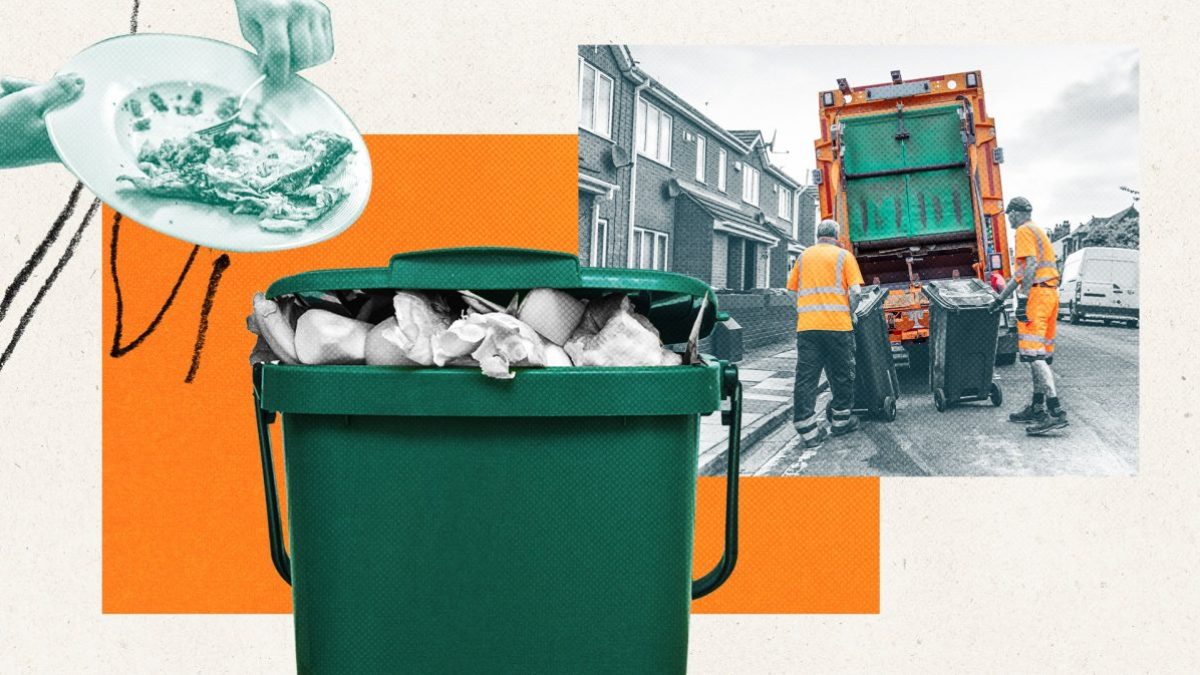Councils across England warn they don’t have funding for extra workers, vehicles and bins in order to rollout weekly food waste collections by a March 2026 deadline
Millions of families are still waiting for food waste bin collections due to a lack of cash for extra workers and collection trucks despite a looming legal deadline.
Only half of councils in England are currently providing food waste recycling, with authorities warning they can’t afford the staff and vehicles needed to provide weekly collections by March 2026.
Research by Climate Emergency UK, shared with The i Paper, found progress in introducing food waste recycling to England has stalled, with some councils even cancelling their free weekly service.
The low recycling rate in England stands in contrast to the rest of the UK where the vast majority of households have access to a food bin.
An estimated 10 million tonnes of food waste is produced each year in the UK, but only 1.8 million is currently recycled, with the rest going to landfill.
The Government has set a legal target that all households in England have free food waste collection by 31 March next year.
The previous Conservative government gave councils £295m to fund the rollout in April 2024.
However, local authorities across England are warning they will miss the Government’s deadline as they argue the funding is not enough to cover the costs of the scheme.
Don von Roland, outreach director at Climate Emergency UK, said the Government’s support for councils had been “half-hearted” and “symptomatic of a government that talks about net zero but fails to provide local governments the guidance and resources they desperately need”.
Of the 296 district and unitary councils in England, just 154 (52 per cent) had a weekly food waste collection as of January this year when Climate Emergency UK conducted its research. The North East, Yorkshire and the East Midlands were among the most notable blackspots with almost no councils providing a weekly service.
The low level of weekly collections is compared to 94 per cent of councils in Scotland, 95 per cent of councils in Wales and all councils in Northern Ireland.
Progress towards food waste recycling has stalled in England with just four councils introducing weekly collections since 2023 when Climate Emergency UK last conducted the research.
At the same time four councils have temporarily cancelled their free food waste collection service: Shropshire, Huntingtonshire, Chesterfield and Cheshire East.
Some of these councils are currently allowing residents to recycle food waste via their paid garden waste collection service. They all said they are working towards providing a free food waste collection service by March 2026.
However, dozens of councils have warned the Government’s deadline will be missed if more funding is not provided to help them cover the cost of new services.
A survey conducted by the District Councils Network (DCN) last year found two thirds of councils in England were not confident about their ability to meet the Government’s March 2026 target.
In April, Great Yarmouth Borough Council said it was facing “major challenges” in meeting the Government’s timeline due to a £400,000 shortfall in the funding it has been provided.
Councils are also waiting for clarity on how much revenue funding they will receive from the Government to cover things like staff wages after the new services are introduced.
This was expected as part of last month’s spending review, but has still not been confirmed, resulting in some councils delaying their plans.
Councillor Richard Wright, spokesperson for the DCN, said district councils are “seeking clarity” on funding in order to roll out food waste collection next year.
“National waste policy has been continuously developing in recent years, with central funding commitments often failing to keep up with the pace of change required, and the timelines sought by the Government often unclear,” he said.
Plans for universal food waste collections were rolled out with public backing – a YouGov poll in 2018 finding 69 per cent of Britons supported the idea of councils providing a separate caddy for food waste to be collected weekly.
Councillor Adam Hug, environment spokesperson for the Local Government Association, said councils “want to recycle as much as they can”, but need “local flexibility on how this service is delivered, alongside adequate funding and support”.
He said councils especially need “clarity” on how much revenue funding they will receive from next year to help them “plan new services”.
It is understood a number of councils have transition agreements with the Government that allows them to wait until current bin contracts have ended before they introduce a food waste collection.
A spokesperson for the Department of Environment, Food and Rural Affairs said: “This Government will introduce a streamlined approach to recycling to end the postcode lottery, simplify bin collections and clean up our streets for good.
“We have invested £300m to support councils on weekly food collections. Local authorities will have the flexibility to deliver these reforms in the best way for their council areas and residents.
“These reforms will cut the cost for waste management by over £200m by 2035.”
